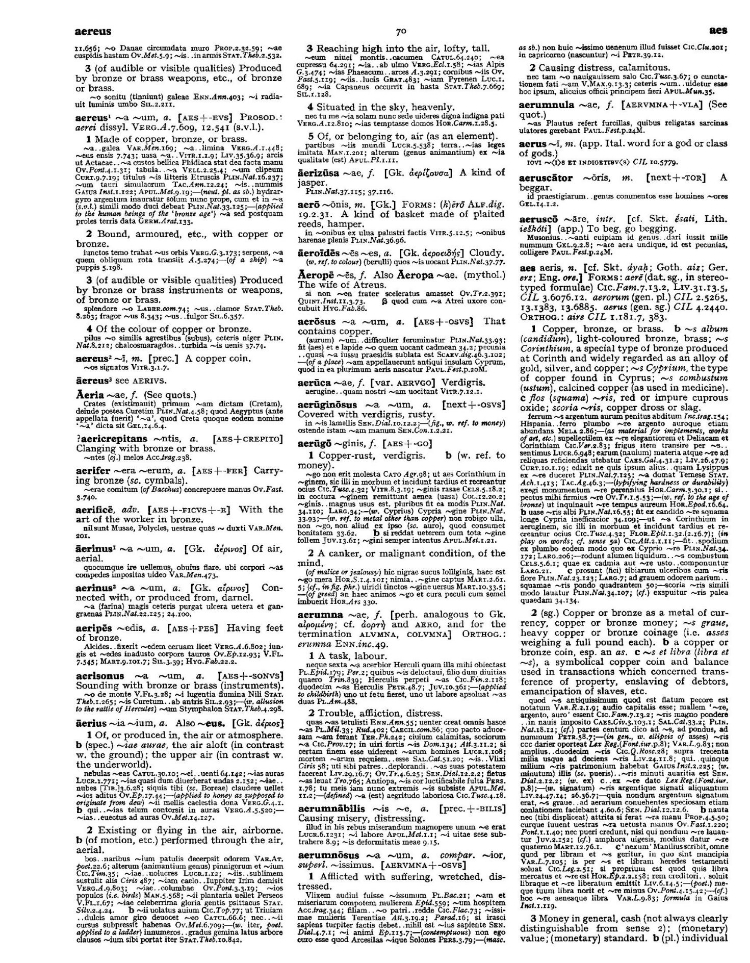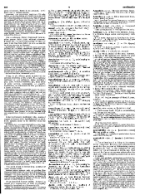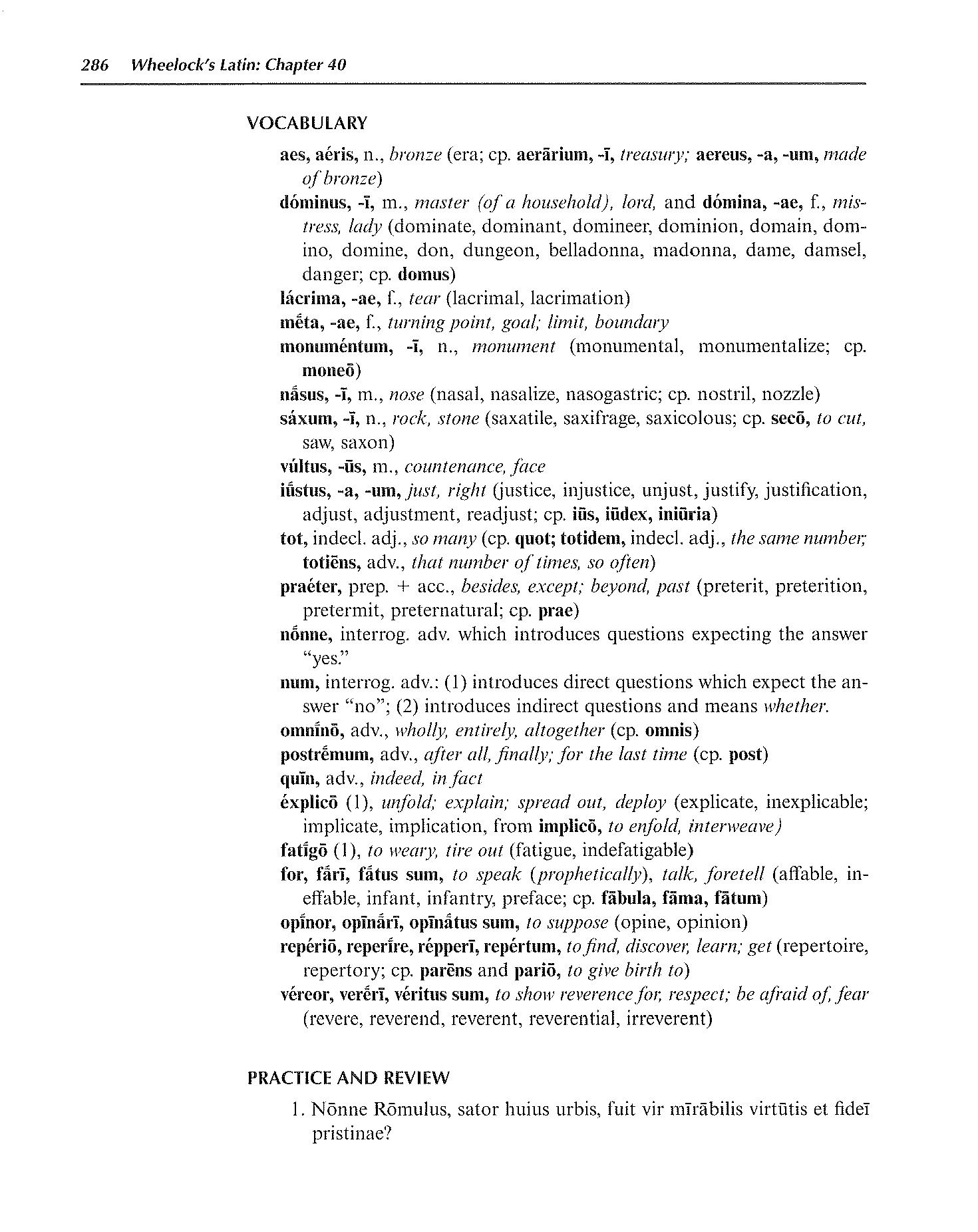
page_listing.tpl
page_subListingDetails.tpl
sub_listingDetails_style1.tpl
sub_listingDetails.title.tpl
aes bronze
aes is a Latin Noun that primarily means bronze.
Definitions for aes
Wheelock's Latin
Noun
- 1
bronze
English derivatives:
era
Oxford Latin Dictionary
Noun
- 1
Copper, bronze, or brass. (b) ~s album (candidum), light-coloured bronze, brass; ~s Corinthium, a special type of bronze produced at Corinth and widely regarded as an alloy of gold, silver, and copper; ~s Cyprium, the type of copper found in Cyprus; ~s combustum (ustum), calcined copper (as used in medicine). (c) flos (squama) ~ris, red or impure cuprous oxide; scoria ~ris, copper dross or slag.
- 2
+(sg.) Copper or bronze as a metal of currency, copper or bronze money; ~s graue, heavy copper or bronze coinage (i.e. asses weighing a full pound each(. (b) a copper or bronze coin, esp. an as. (c) ~s et libra (libra et ~s), a symbolical copper coin and balance used in transactions which concerned transference of property, enslaving of debtors, emancipation of slaves, etc.
- 3
Money in general, cash (not always clearly distinguishable from sense 2); (monetary) value; (monetary) standard. (b) (pl.) individual sums of money, items in an account. (c) tribuni ~ris = tribuni aerarii.
Sentences with aes
Latin to English
Viator, audi. Si libet, intus veni: tabula est aes quae te cuncta perdocet.Compare Traveler, listen. Come inside if you like: there’s a bronze tablet which gives you all the information.
Exegi monumentum aere perennius. (Horace, Odes III.30.1)Compare I have erected a monument more lasting than bronze.
Declension table for aes
Cactus2000
| Singular | Plural | |
| Nom. | aes | aera |
| Gen. | aeris | aerum |
| Dat. | aerī | aeribus |
| Acc. | aes | aera |
| Abl. | aere | aeribus |
Data sources
Notes
- Definitions
- Frederick M. Wheelock, Wheelock's Latin, 6th ed., rev. Richard A. LaFleur (New York, NY: HarperCollins Publishers, 2005): 286.
- P. G. W. Glare, Oxford Latin Dictionary, Vols. 1-8 (Oxford: Clarendon Press, 1982): 70.
- Word frequencies
- Christopher Francese, "Latin Core Vocabulary," Dickinson College Commentaries, last modified 2014, http://dcc.dickinson.edu.
- Paul B. Diederich, The Frequency of Latin Words and Their Endings, PhD diss., (Columbia University, 1939).
- Louis Delatte, Suzanne Govaerts, Joseph Denooz, and Etienne Evrard, Dictionnaire fréquentiel et index inverse de la langue latine [Frequency Dictionary and Inverse Index of the Latin Language] (Liège, Belgium: Laboratoire d'analyse statistique des langues anciennes de l'Université de Liège [L.A.S.L.A.], 1981): 125.
Bibliography
Allen, Joseph H. Allen and Greenough's New Latin Grammar for Schools and Colleges: Founded on Comparative Grammar. Edited by James B. Greenough, George L. Kittredge, Albert A. Howard, and Benjamin L. D'Ooge. Boston, MA: Ginn & Company, 1903.
Crystal, David. A Dictionary of Linguistics and Phonetics. 6th ed. Oxford, UK: Blackwell Publishing, 2008.
Delatte, Louis, Suzanne Govaerts, Joseph Denooz, and Etienne Evrard. Dictionnaire fréquentiel et index inverse de la langue latine [Frequency Dictionary and Inverse Index of the Latin Language]. Liège, Belgium: Laboratoire d'analyse statistique des langues anciennes de l'Université de Liège (L.A.S.L.A.), 1981.
Diederich, Paul B. The Frequency of Latin Words and Their Endings. PhD diss., Columbia University, 1939.
Francese, Christopher. "Latin Core Vocabulary." Dickinson College Commentaries. Last modified 2014. http://dcc.dickinson.edu/latin-vocabulary-list.
Gildersleeve, Basil L., and Gonzales Lodge. Gildersleeve's Latin Grammar: Third Edition, Revised, and Enlarged. 3rd ed. London, England: Macmillan and Co., 1903.
Glare, Peter G.W. Oxford Latin Dictionary. Vols. 1-8. Oxford, England: Clarendon Press, 1982.
Krüger, Bernd. "Latin Conjugation Tables." Cactus2000. Accessed May 5, 2023. https://latin.cactus2000.de/index.en.php.
Pierson, Nick. "Sound of Text." Accessed October 26, 2019. https://soundoftext.com.
Wheelock, Frederick M. Wheelock's Latin. 6th ed. Revised by Richard A. LaFleur. New York, NY: HarperCollins Publishers, 2005.
Wiktionary Contributors. "Victionarium." Wikimedia Foundation, Inc. Updated March 18, 2019. https://la.wiktionary.org/wiki/Victionarium:Pagina_prima.
Citation
Chicago (17th ed.)
Allo Contributors. "aes, aeris (n.) - Latin Word Definition." Allo Latin Dictionary. Last modified . Accessed February 19, 2026. http://ancientlanguages.org/latin/dictionary/aes-aeris.
Entry created on . Last updated on .








